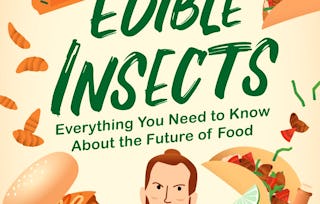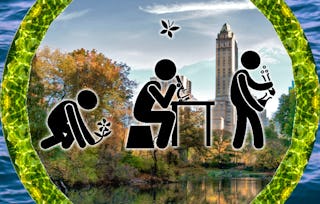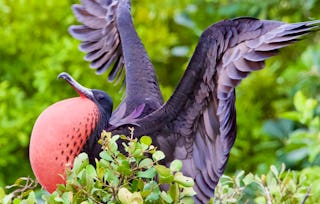Of all the animals on earth, which are the strongest for their size? What about the fastest? Who were the first animals to evolve flight? Insects take all of these titles and more! As the most abundant animals on the planet, insects and other arthropods affect our lives in so many ways. From beneficial interactions like pollination and biological pest control, to the transmission of life threatening diseases; this course will teach you about the big ways that these little arthropods impact our lives.

Bugs 101: Insect-Human Interactions

1,524 reviews
Skills you'll gain
Details to know
14 assignments
See how employees at top companies are mastering in-demand skills

There are 13 modules in this course
Arthropods, which includes insects, are the most speciose group of animals on the planet. In this module, we explore some of the traits that have allowed insects to dominate terrestrial landscapes around the world, and introduce you to the major insect orders you’ll deal with in the course.
What's included
12 videos9 readings2 assignments2 plugins
What makes an insect an insect? How do these strange creatures operate? This module begins to uncover the inner workings of insects, starting with the digestive and circulatory systems.
What's included
6 videos2 readings1 assignment4 plugins
Building on the previous module, we continue to explore insect biology through an overview of the major physiological systems of insects. We look at the nervous and reproductive systems, and highlight some of the ways insects court, seduce, and reproduce.
What's included
7 videos2 readings1 assignment3 plugins
Did you know that insects are the strongest animals in the world for their size? Find out what makes insects so strong in this module, in which we introduce insect musculature and how they use it to get around. From swimming to flying, we explore the many ways insects move and the specialized appendages they've evolved to do so.
What's included
12 videos2 readings1 assignment2 plugins
Without decomposers, dead trees and leaves would pile up in forests, and we would be walking knee deep in dung and animal carcasses. Insect decomposers help to recycle these materials and many others back into the earth, recycling the nutrients to be used by other organisms again. This module unearths the importance of these decomposers to our ecosystem, and even discusses some ways these insects can be used to help solve crimes.
What's included
6 videos2 readings1 assignment
This module focuses on the vegetarians of the insect world. A long evolutionary history with plants has led to the development of some interesting feeding strategies in insects, and some wild defenses in the plants they eat. Some of these herbivores can be important pests, and may change entire ecosystems through their feeding.
What's included
7 videos2 readings1 assignment1 plugin
Over millions of years, pollinators have formed a close relationship with flowering plants, and have helped shape our society and the world around us. Today, many crops are reliant on pollinating insects, and entire industries have been developed around beekeeping. We explore pollination and beekeeping in this module, and discuss some of the challenges pollinators face in our rapidly changing world.
What's included
9 videos3 readings1 assignment
Many globally important diseases can be transmitted by insects, and insects themselves can present a nuisance in some situations. This module compares different modes of disease transmission, and highlights some important diseases of plants, humans, and other animals.
What's included
6 videos2 readings1 assignment
Integrated pest management (IPM) is a pillar of modern crop production, and the preservation of ecosystem function/health. A variety of chemical pesticides can be a part of IPM programs. The different insecticides available to manage insect pests vary in many regards, such as their modes of action and application. The use of these pesticides is not without risks, however, and these must be considered if we want to reap the benefits these chemicals can provide.
What's included
6 videos2 readings1 assignment
Biological and cultural control strategies are critical components of IPM systems that allow us to control pests in different ways, and reduce the input of chemical pesticides into the environment. This module introduces these two approaches, and a wide variety of biological control agents which can be employed to control insect pests.
What's included
6 videos3 readings1 assignment
Many of us have thought at one time or another that the world may be better off without pest insects like mosquitoes. This module aims to change that view, as we discuss the importance of insect conservation and the variety of ways the changing world impacts insect populations.
What's included
7 videos3 readings1 assignment
Entomologists are not the only ones to be inspired by the insect world. From historical myths and folklore, to modern art, film, and even video games; insects and other arthropods have appeared throughout human culture. They have even influenced the development of new technologies, and could be part of the solution to global issues like food shortages.
What's included
6 videos3 readings1 assignment
We hope that you have enjoyed the course, and walk away with a newfound appreciation for the insect world. Check out this module to hear about your instructors favourite insects, and don’t forget to complete the post-course quiz to see if your perceptions have changed!
What's included
1 video1 reading1 assignment
Instructor

Offered by
Explore more from Basic Science
 Status: Preview
Status: PreviewNational Taiwan University
 Status: Preview
Status: PreviewUniversiteit Leiden
 Status: Free Trial
Status: Free TrialRice University
 Status: Preview
Status: PreviewAmerican Museum of Natural History
Why people choose Coursera for their career

Felipe M.

Jennifer J.

Larry W.

Chaitanya A.
Learner reviews
- 5 stars
91.99%
- 4 stars
6.23%
- 3 stars
1.04%
- 2 stars
0.13%
- 1 star
0.59%
Showing 3 of 1524
Reviewed on Jul 7, 2020
Very interesting and specially the anchors of this course are very enthusiastic and encouraging throughout the course so my focus is maintain for bugs and surly I will search more on insects further.
Reviewed on Mar 26, 2020
Professors are knowledgeable. I obtained so much information about my future career in this one course! I honestly plan on taking it again at some point to refresh my memory and hone my skills.
Reviewed on Nov 19, 2020
An absolutely fantastic course with logically set-out modules and enthusiastic, inspiring and engaging presenters. Very useful for anyone involved in Science outreach and/or widening participation.

Open new doors with Coursera Plus
Unlimited access to 10,000+ world-class courses, hands-on projects, and job-ready certificate programs - all included in your subscription
Advance your career with an online degree
Earn a degree from world-class universities - 100% online
Join over 3,400 global companies that choose Coursera for Business
Upskill your employees to excel in the digital economy
Frequently asked questions
To access the course materials, assignments and to earn a Certificate, you will need to purchase the Certificate experience when you enroll in a course. You can try a Free Trial instead, or apply for Financial Aid. The course may offer 'Full Course, No Certificate' instead. This option lets you see all course materials, submit required assessments, and get a final grade. This also means that you will not be able to purchase a Certificate experience.
More questions
Financial aid available,

